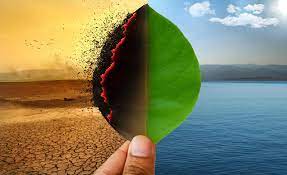Muhammad Fazal ur Rahman
Given the significant damage that climate change poses to future generations through causing irregular rainfall in longer winters and summers, it has become a challenging issue, but it is not receiving the attention it deserves.
Currently, the impacts of this change on agriculture, seasons, and human health are very alarming, necessitating effective counter-measures to be taken to offset those grave effects and provide a healthy environment for the young generation to live in.
Prime Minister of Pakistan, Anwar ul Haq Kakar also highlighted during a session in the General Assembly Pakistan’s vulnerability to the consequences of climate change, describing Pakistan on the top of the list containing the most affected countries of climate change. In April of this financial year, the United Nations Meteorological Organization (WMO) said that due to frequent climate change, there were more droughts and floods in the world last year than ever before.
Extreme heat waves have increased risks to lives and jobs and Pakistan experienced devastating floods during July and August last year, resulting in over 1,700 casualties and affecting more than 33 million people.
The WMO made it clear that the overall economic loss due to this flood amounted to over $30 billion, and by October 2022, 8 million people were internally displaced.
The Dera Ismail Khan district in Khyber Pakhtunkhwa has the largest cultivable land area, with nearly 5.5 million acres under cultivation. However, nearly 5 million acres of land in this region is still not cultivable due to water scarcity.
Agricultural experts described Dera Ismail Khan as Pakistan’s food basket, as it contributes around 42 lakh tons of wheat and 20 lakh tons of rice to the country.
Last year’s flood in the Chashma Right Bank Canal caused substantial economic losses. Aqeel Azhar, Superintending Engineer of the Department of Irrigation says if we only assess the economic loss resulting from the third phase of Chashma Right Bank Canal then a alarming data comes out.
He says that CRBC is an inter-provincial canal that starts from Jumma Head and extends up to the Dera Ghazi Khan district in Punjab. It includes 94 miles of long canal that is shared between Khyber Pakhtunkhwa’s Dera Ismail Khan and Punjab’s Dera Ghazi Khan. He says in this section of the 94-mile-long canal, 30 miles of Khyber Pakhtunkhwa Dera Ismail Khan and 64 miles of Dera Ghazi Khan Punjab are included and through the segment a total of three hundred and sixty-two thousand areas is irrigated.
One hundred and twenty-six thousand acres of land and two hundred and thirty-six thousand acres of Punjab province are irrigated, and according to official data, when this canal was being built, the number of families benefited from it was fifty-three thousand. During this period, this part of the canal suffered damage from several places and the flow of water in the canal was stopped. Seven hundred million rupees was allocated by the federal government for the repair of the flood-affected Chashma Right Bank Canal.
Faisal Karim Kundi former Advisor to the Prime Minister and Minister of State for Social Security from Dera Asma Ail Khan, along with Minister of State for Water Resources Muhammad Ali Bacha, on May 1, 2023 for the restoration of the most affected Phase III, started the restoration work of Phase III and issued instructions to ensure the restoration of the this part in one month. But despite the passage of four months, the restoration of the canal could not be done.
President of the Agriculture Council, Haji Abdul Rasheed Dhap, says that due to the lack of canal repair work the sugarcane crop in the area has been destroyed by 80 percent and the production of wheat has decreased by 70 percent last year. The former MPA of the constituency, Maulana Lutfur Rehman, says that for the repair of the said canal, we have requested the special assistance of Quaid Jamiat Maulana Fazlur Rehman.
According to a report published on climate change in Pakistan and India, extreme weather conditions besides threatening water scarcity, sources of income and agriculture. It is also rapidly creating threats every summer, heavy monsoon rains cause flash floods, damage to property and loss of lives in the fertile lands of Punjab and Sindh. These results are getting worse every year.
Last summer, the temperature in Jacobabad reached a record high of 51 degrees Celsius (which is about 123 degrees Fahrenheit), the highest temperature ever recorded in South Asia.
Farmers in India estimated that 10-15% of their crops were destroyed by the rise in temperature. As the number of such weather shocks is likely to increase in the coming years, a senior official of the Irrigation Department, Dera Asma Ail Khan, says that one lakh people will be affected by the CRBC Phase III within Dera Ismaail Khan limits alone. In light of the data collected last year, the loss to the landowners associated with the said affected part of the canal is estimated at forty-four billion in one year.
In the same way, the loss to the landowners of 236,000 acres connected with the 64 miles of the canal within the boundaries of the Punjab province and then the loss to the government due to non-supply of irrigation water is much more than in Khyber Pakhtunkhwa.
The effects of climate change where are affecting wheat, cotton, rice and sugarcane crops, while the people involved in date production in Dera Ismail Khan are also worried about climate change and related factors, said Dr. Shahzad Arshad Salim Saduzai, the well-known award-winning agricultural scientist in charge of the Food Technology Section of Rata Kalachi Research Center. He said that the date crop was being affected due to climate change. It has a distinctive status due to its taste and other characteristics.
When the pollination phase of dates comes, if there is unseasonal rain on this occasion, the pollen is blown away. Due to the rains in this season, the date crop in Paniala area is up to forty percent.
As a result the pollen was affected by the rain and according to the local farmers, the palm was left ‘Khasi’ i.e. it was left without the kernel. At this time, due to rain, fungus attacks the date palm and the crop is affected, and if there is no rain and the drought is prolonged, then the palm plantations are also destroyed, he remarked.
He was of opinion to invest in sustainable agricultural development practices and projects to adapt to climate change, which may include shifting to Climate Smart Agriculture (CSA) practices such as shifting to high-yielding crops, water efficiency Management, reduction of water wastage, construction of small and medium-sized dams to deal with water scarcity and increase agricultural production, etc. However, this work cannot be done by the government alone. So, it is very important to be active to create awareness among people in this regard.







